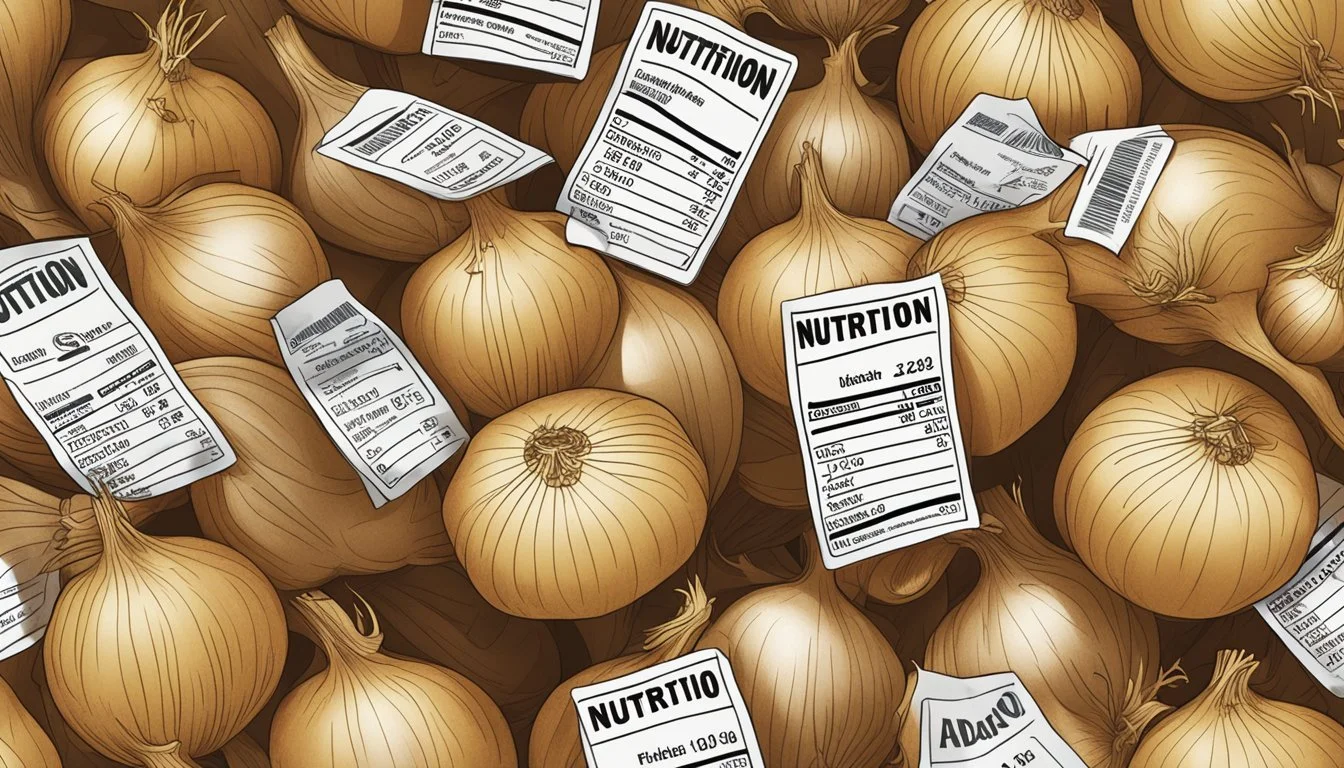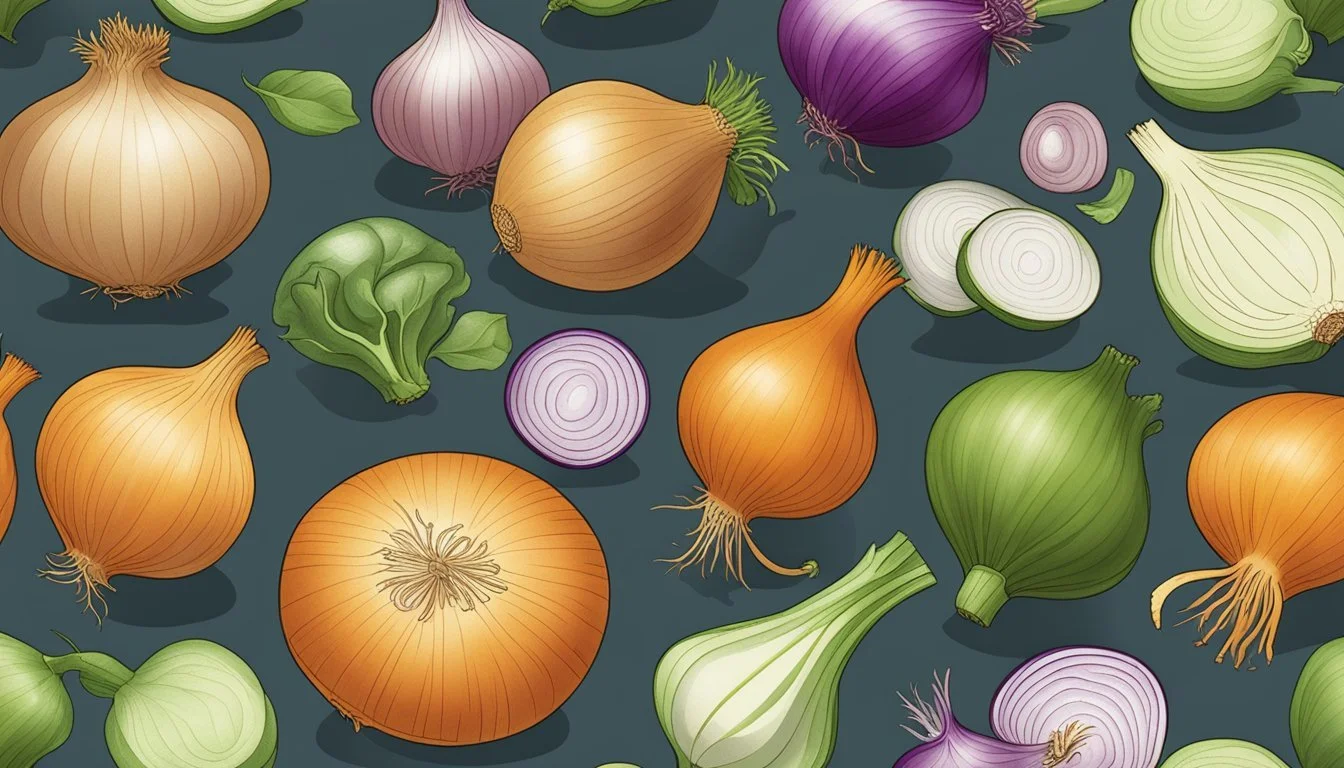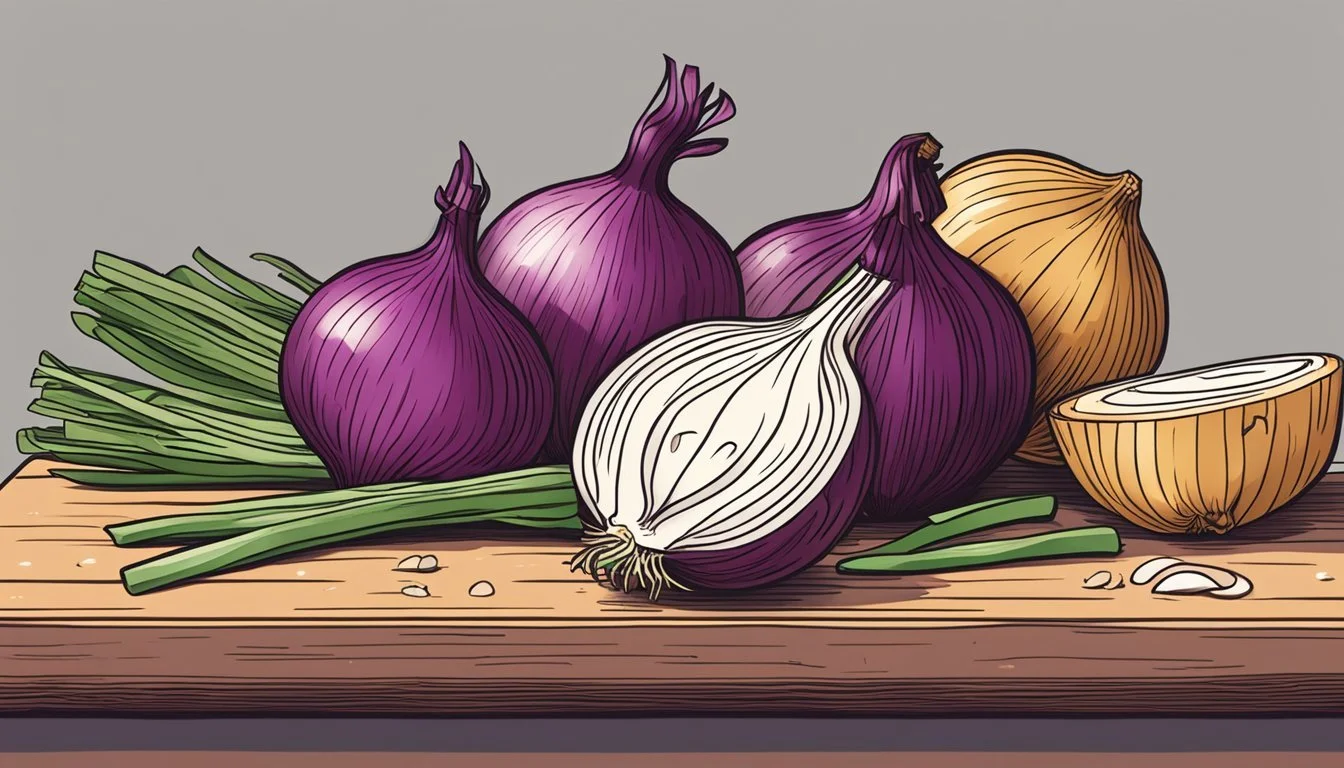How Much Onion Per Day is Too Much?
Understanding Daily Limits
Onions (What wine goes well with onions?) are a staple in many cuisines, praised for their flavor and health benefits. They are rich in antioxidants, may support heart health, and possess antibacterial properties. However, as with many foods, there is a point where consumption can become excessive. Identifying the threshold for onion intake is important to avoid potential side effects without missing out on their nutritional advantages.
Consuming onions in moderation is generally safe for most individuals. While there is no one-size-fits-all answer to how much onion per day is too much, incorporating them as part of a balanced diet is key. Excessive consumption could lead to gastrointestinal discomfort or exacerbate symptoms in those with sensitive stomachs or conditions like irritable bowel syndrome. Moderation ensures that the body can reap the health benefits of onions without adverse effects.
It's essential to consider individual dietary needs and health conditions when determining the appropriate amount of onions in a daily diet. For those with a particular fondness for onions or who use them frequently in cooking, it's recommended to be mindful of their body's reactions and consult with a healthcare professional if any concerns arise.
Nutritional Profile of Onions
Onions are valued not only for their distinctive flavor but also for their nutritional benefits. They are low in calories and high in vitamins and minerals.
Caloric Content: A medium-sized onion has approximately 44 calories, making it a low-calorie addition to a variety of dishes.
Water Content: Onions are composed of about 89% water, which contributes to their low caloric content and makes them a healthy hydration option.
Carbohydrates and Fiber: They contain about 10.3 grams of carbohydrates per medium-sized onion, with 1.7% of that being dietary fiber. Fiber is important for maintaining a healthy digestive system.
Vitamins:
Vitamin C: Onions are a good source of vitamin C, an antioxidant that aids in immune function.
Vitamin B6: They also provide vitamin B6, essential for energy metabolism and cognitive development.
Folate: Onions contain folate, crucial for cell growth and metabolism.
Minerals:
Potassium: A notable mineral present in onions is potassium, which is needed for maintaining fluid balance and proper nerve and muscle function.
Calcium: While not abundant in onions, there is a small amount of calcium, important for bone health and enzymatic functions.
In sum, onions offer a range of nutrients beneficial for overall health, including fiber, potassium, vitamin C, folate, and vitamin B6, with minimal calories and fat content.
Health Benefits of Regular Onion Consumption
Onions are highly valued for their health benefits, and incorporating them into your diet can offer a multitude of advantages. These range from promoting heart health to strengthening the immune system. Each subsection below explores a specific health aspect that onions contribute to.
Heart Health and Onions
Regular consumption of onions is linked to improved heart health. They contain antioxidants such as quercetin, which are known to help reduce blood pressure and fight inflammation. Additionally, onions can aid in lowering levels of LDL (bad) cholesterol, which is a contributor to heart disease.
Onion's Impact on Inflammation and Immune Response
Onions have anti-inflammatory properties that may regulate the body’s immune response. The compounds found in onions, like quercetin and sulfur, can also support the immune system, helping the body defend against illness.
Onion's Potential in Cancer Prevention
Consuming onions may have a protective effect against certain types of cancer. The antioxidants and compounds like flavonoids, which are present in onions, have been shown to inhibit tumor growth and promote cancer cell destruction in some studies.
Supporting Digestive Health With Onions
Onions are a good source of fiber, which is beneficial for digestive health. Fiber aids in preventing digestion-related problems and can be particularly helpful for those suffering from conditions like irritable bowel syndrome (IBS). However, individuals sensitive to FODMAPs should be mindful of their onion consumption.
Regulation of Blood Sugar through Onions
Inclusion of onions in the diet might help with the regulation of blood sugar levels. This can be particularly important for individuals managing diabetes. The compounds in onions have been noted to assist in blood sugar control.
Onion Consumption and Bone Health
Studies suggest a correlation between the consumption of raw onion and increased bone density, potentially lowering the risk of osteoporosis. Onions may help to strengthen bones and promote bone health.
Antimicrobial and Antibacterial Effects of Onions
Onions exhibit antimicrobial and antibacterial properties due to their sulfur-containing compounds. These can assist in fighting off bacteria, making onions a valuable addition to a diet for maintaining overall health.
How Onions Influence Allergies and Respiratory Conditions
Some evidence indicates that the antioxidant properties of onions can benefit individuals with allergies and asthma. By reducing allergic reactions and possibly easing respiratory conditions, onions can contribute to better respiratory health.
Daily Onion Intake: How Much is Too Much?
Onions are a staple in many cuisines due to their flavor-enhancing properties. They also offer numerous health benefits such as promoting heart health, providing anti-inflammatory effects, and supporting digestive function through their fiber content. It's important, however, to consume onions in moderation to avoid potential side effects.
An individual’s tolerance to onions varies, but generally, gastrointestinal issues are observed with high consumption. Onions are predominantly made up of carbohydrates and contain fructans, which can cause discomfort like bloating, gas, and cramps in sensitive individuals.
Recommended Daily Intake:
Adults: One medium-sized onion (approximately 120 grams)
Potential Side Effects of Excess Consumption:
Bloating
Fatigue
Abdominal cramps
Heartburn
Poor digestion
While onions have no fat or cholesterol and are low in calories, it's crucial to balance their intake. A high intake of onions can lead to discomfort, which underscores the importance of moderation in their consumption.
Nutritional experts suggest incorporating onions as part of a varied and balanced diet. Individuals with a known sensitivity should adjust their intake accordingly and may benefit from consuming smaller amounts.
In summary, while the exact threshold can vary by person, sticking to about one medium-sized onion a day should help avoid the common side effects, allowing for the enjoyment of the health benefits of onions without the discomfort.
The Side Effects of Excessive Onion Consumption
While onions are commonly used to enhance flavor in dishes, consuming them in large quantities can lead to a variety of side effects affecting digestion, breath, body odor, and can exacerbate certain medical conditions.
Gastrointestinal Issues from Too Much Onion
Eating an excessive amount of onions can cause undesirable gastrointestinal effects. Common issues include:
Stomachaches: Onions contain fructans, which can be difficult to digest.
Bloating and Gas: These may result from the fermentation of undigested fructans in the large intestine.
Irritable Bowel Syndrome (IBS): Those with IBS may find their symptoms worsen after consuming onions.
Onion-Induced Halitosis and Body Odor
Consequences of high onion consumption extend to one's breath and body odor:
Bad Breath: The sulfur compounds in onions can cause a persistent, unpleasant breath odor.
Body Odor: These same sulfur compounds can be released through pores, contributing to body odor.
Allergies and Sensitivities Related to Onion
A subset of individuals may experience allergies and sensitivities to onions, characterized by:
Allergic Reactions: Ranging from mild skin irritation to severe responses that necessitate medical attention.
Sensitivities: Symptoms can mimic those of allergies, such as itching or swelling, without a full-blown allergic response.
Contributions to Acid Reflux and Heartburn
Onions, particularly raw, are known irritants that may contribute to gastric discomfort:
Acid Reflux: Onions can relax the lower esophageal sphincter, increasing the likelihood of stomach acids entering the esophagus.
Heartburn: The resultant acid backflow from reflux can cause a burning sensation in the chest or throat.
Comparison of Onion Types and Their Benefits
Understanding the differences between onion types and how they affect nutrition and taste when raw or cooked is key to maximizing their health benefits and catering to culinary needs.
Differences Between Raw and Cooked Onions
Raw onions tend to have a more pungent flavor and retain their high levels of vitamins and minerals better than their cooked counterparts. When cooked, onions become sweeter and less harsh, making them more versatile in dishes like sautéing and caramelizing. Cooking can reduce some vitamins, yet others become more absorbable.
Varieties of Onions and Their Unique Properties
Onions come in a range of types, each with unique flavors and uses in cooking:
Yellow onions are the all-purpose variety, with a balance between sweet and sharp taste, widely used for sautéing and caramelizing.
Red onions possess a mild to spicy flavor, ideal for fresh dishes and garnishes due to their vibrant color and milder raw bite.
White onions have a sharp and somewhat spicier flavor, often preferred in Mexican cuisines.
Sweet onions are less pungent, high in sugar, and perfect for dishes where a gentle, sweet flavor is desired.
Green onions or scallions are milder in flavor, consumed raw or lightly cooked, and include both the white base and green stalk.
Each type of onion has its own nutritional profile, with some variations in vitamin C content, antioxidants, and fiber.
Allium Family: Onions, Garlic, and Relatives
The Allium family includes onions, garlic, leeks, chives, scallions, shallots, and more, known for their versatile uses in cooking and potential health benefits. These vegetables are rich in vitamins A, C, and K, and contain compounds like allicin, potentially offering protection against cancer. Garlic, for instance, is renowned for its strong flavor and potential medicinal properties.
Each member of the Allium family carries a unique taste, with shallots being mild and sweet, chives offering a delicate onion flavor, and leeks providing a milder version of the typical onion essence. They contribute a variety of tastes and health benefits to dishes worldwide.
Culinary Uses and Preparation
When preparing and cooking onions, one can employ certain techniques to enhance their culinary application while minimizing discomforts such as eye irritation and strong flavors that might overpower a dish.
Tips for Minimizing Onion-Induced Eye Irritation
Chilling onions before cutting can greatly reduce the release of the enzyme-laced vapors that cause eye irritation. A sharp knife is essential as it causes less damage to the cell walls of the onion, thus releasing fewer irritants. To further decrease discomfort, one can:
Chill onions for 30 minutes prior to chopping.
Cut onions near running water or under a vent to draw the gases away.
Using Onions in Salads and Uncooked Dishes
Onions are a popular addition to salads and other raw dishes, providing a flavorful crunch. For a milder taste, thinly sliced raw onions can be soaked in water for 10 to 60 minutes before being patted dry and added to the salad. This method reduces the onion's sharpness, making it more palatable when eaten raw.
Methods for Reducing Onion's Pungency During Cooking
The process of cooking onions, especially caramelizing, naturally reduces pungency. Cooking onions until they are caramelized, which entails a slow sauté over low heat, brings out their natural sweetness and mitigates the potent punch they can deliver when raw. Quick methods for reducing pungency include:
Rinsing onions under cold water for 30 to 60 seconds before cooking.
Soaking sliced onions in water as a less intensive but effective method for milder flavor.
These methods allow onions to contribute their unique flavor to cooked dishes without overpowering other ingredients.
Onions in Diet and Lifestyle
Onions are a staple in kitchens around the world and possess a variety of nutrients that contribute to a balanced diet. They are particularly known for being low in calories and a good source of fiber. An average medium-sized onion contains about 1.7% fiber, which aids in digestion and contributes to the feeling of fullness.
The presence of certain minerals in onions, such as potassium, is noteworthy. Potassium is crucial for maintaining cellular function and plays a role in heart health, muscle function, and nerve signaling.
Nutritional Highlights of Onions:
Fiber: Promotes digestive health and weight management.
Potassium: Essential for normal cell function.
In the context of chronic diseases like cancer, onions contain antioxidants and compounds that have been researched for their potential protective roles. The antioxidants may help reduce inflammation and combat the proliferation of unhealthy cells.
Incorporating onions into a diet can vary. They can be consumed raw in salads, or cooked in various dishes, contributing to both flavor and nutritional content. However, moderation is key. The following points should be considered:
Excessive consumption of onions can lead to gastrointestinal distress.
People with a sensitivity to FODMAPs may need to limit their intake.
Recommended Onion Serving Sizes:
Raw: A few rings in salads or sandwiches.
Cooked: Half a cup, sautéed or mixed into dishes.
When including onions in one's diet, it’s important to note individual tolerance levels and dietary requirements. Each person’s nutritional needs are different, and it is recommended to consult with a healthcare provider or a registered dietitian for personalized advice.
FAQs
When considering the inclusion of onions in a daily diet, it is essential to recognize their interaction with medications, effects on blood pressure and blood sugar, their role in weight management, and potential benefits for skin and aging.
Are There Any Interactions Between Onion Consumption and Medications?
Onions can affect how certain drugs work in the body. For instance, due to their natural blood-thinning properties, onions may enhance the effects of blood thinners such as warfarin, possibly leading to an increased risk of bleeding. Individuals taking such medication should consult with healthcare providers before significantly increasing onion intake.
How Do Onions Affect Blood Pressure and Blood Sugar?
Blood Pressure: Onions contain antioxidants and compounds that may help to lower blood pressure in some individuals. This can be beneficial for those managing hypertension.
Blood Sugar: Onions have a low calorie count and a moderate glycemic index, meaning they can contribute to a balanced diet without causing drastic spikes in blood sugar levels. This is particularly helpful for people with diabetes or those trying to manage their blood sugar.
Can Onions Be a Part of a Weight Management Diet?
Onions are low in calories and fat, making them an excellent addition to a weight management diet. They add flavor with minimal caloric impact and contain fiber, which promotes satiety and may aid in controlling appetite.
What Are the Potential Benefits of Onion for Skin and Aging?
Onions are rich in vitamins and antioxidants, which may contribute to skin health. The vitamin C and quercetin found in onions can help in fighting inflammation and reducing the appearance of aging by protecting the skin from free radical damage. However, individual results may vary, and onions should be part of a balanced skincare routine.
Conclusions
In determining the ideal daily intake of onions, individuals should consider both the health benefits and potential side effects. Onions, rich in antioxidants like quercetin, contribute positively to heart health, reduce inflammation, and possess antibacterial properties. However, there is a threshold beyond which the consumption of onions can lead to discomfort and adverse health effects.
Recommended Daily Intake:
A reasonable quantity of onions to consume daily is between 50 to 80 grams. This amount is sufficient to harness the vegetable's health advantages without overwhelming the body.
Effects of Excessive Consumption:
Gastrointestinal Discomfort: Overconsumption may cause symptoms such as stomachaches, bloating, abdominal cramps, and poor digestion.
Carbohydrate Content: Onions have a high carbohydrate content that, in excess, can lead to fatigue and exacerbate symptoms like heartburn and acid reflux in sensitive individuals.
Moderation is Key:
It is essential for consumers to observe moderation to prevent the negative side effects associated with excessive onion intake.
Individuals with intolerance or sensitivity to onions should be particularly cautious to avoid irritation of the stomach lining.
By adhering to the recommended daily intake, one can enjoy the health benefits of onions while mitigating potential side effects. It is always best to tailor consumption habits to one's personal health needs and to consult with healthcare professionals in cases of uncertainty or pre-existing health conditions.







